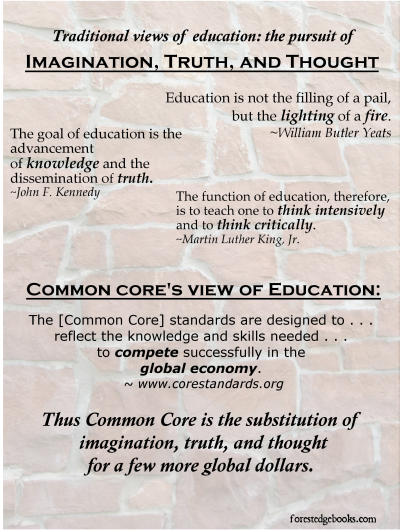There are revolutions happening all around us in America, but we don’t always recognize them. But once we do, we realize we can be part of them.
If we dare.
Most of these revolutions arise from breaking with the status quo of our ancestors. And not just talking about change, but actually being part of it. Too often we spout niceties about being original and different, but in reality we’re terrified to not follow the crowd. Too frequently we want to be in on the latest trend, say the right thing in whatever is deemed politically correct for the day, and to be counted among the winners.
And that last reason—to be among the winners—is why people are afraid to be different.
For example, while so many people are personally opposed to both of the major political candidates running for president, they’ll vote for one of them anyway because that’s how it’s always been.
But that doesn’t have to be. We can begin to change the system, this year.
I know that’s scary talk, and I heard someone comment that this isn’t the time for a revolution, but revolutions are happening all the time. Every day people are rejecting what corporations and governments, and what tradition and the status quo, have been dictating should be.
This has always been the way change begins—not with large organizations or ensconced traditions, but with individuals. Margaret Mead famously said,
“Never doubt that a small group of thoughtful, committed citizens can change the world; indeed, it’s the only thing that ever has.”
 Citizens have always taken it upon themselves to instigate change. Back in 1776 Thomas Paine published “Common Sense,” advocating that the colonies separate themselves from Britain. An individual—not a corporation or organization—gave other citizens the idea to break with the current tradition and be brave enough to begin the Revolutionary War.
Citizens have always taken it upon themselves to instigate change. Back in 1776 Thomas Paine published “Common Sense,” advocating that the colonies separate themselves from Britain. An individual—not a corporation or organization—gave other citizens the idea to break with the current tradition and be brave enough to begin the Revolutionary War.
Not that all acts by individuals will lead to such dramatic events (and there were certainly many more factors contributing to the war). But people have been going contrary to the prevailing winds for a long time. Eleanor Roosevelt once said,
“Remember always that you not only have the right to be an individual, you have an obligation to be one.”
What this means, as Hugh Nibley has written, is that we need to “Be different. Then you can make a contribution. Otherwise, you just echo something; you’re just a reflection.”

Emil Neufeldt
Many years ago, the Nazi party tried to make my great-grandfather into a reflection. Emil Neufeldt, who lived in the Prussian region of Germany during WWII, was a wealthy inventor and engineer, with great influence in the sugar industry. The Nazis knew someone with his stature and money would be beneficial to their cause, so in the 1930s they sent one of their best to recruit him.
My great-grandfather wanted nothing to do with the Nazis, but knew that openly opposing them could cause him trouble. So he came up with an idea. Known to be able to hold his alcohol, Emil drank the Nazi recruiter under the table. Then he marched to the local Nazi headquarters and demanded they drag their recruiter home. He told them in no uncertain terms they should never dare again try to make him one of their own.
Did Emil Neufeldt stop World War II? No.
Did he stop the Nazis? No.
Did he secure safety for his family and household, and not be bothered by embarrassed and humiliated fascists again? Yes, he did.
He made a difference in his small part of the world, and eighty years later his great-granddaughter proudly remembers his example of not following the dubious safety of authority. (Even though it involved alcohol.)
My mother also told me of a Catholic priest in their area who, in the early years of WWII, preached openly about the atrocities of the Nazis, and publicly questioned where all the Jews were going.
He vanished shortly after, never to be heard from again. Did he change the world then? Stop the Nazis? Discover and reveal what was happening to the disappearing Jews?
No.
He likely met their same fate in some concentration camp. But his bravery is remembered, right here, today. His words and worries and defiance was repeated, many times over by others just as daring, and eventually the war ended and the horrible truth was revealed.
We don’t remember mere reflections. We remember innovators. We remember those who changed the world, for better and for worse.
We remember contrarians. The word coined by Richard and Linda Eyre means”to go against the prevailing wisdom, to contradict what the majority seems to be thinking or doing. [A] ‘contrarian’ . . . describe[s] someone who thinks for himself and who is not swayed by trends or popularity or styles or the direction of the crowd.”
This is happening, all around us. Contrarianism frequently means rejecting foolish traditions of the past.
For example, when I was a teenager in the 1980s rampant consumerism was the tradition. You were openly judged based upon what you wore, what you have, and how big your house was. (Anyone remember Yuppies or “Lifestyles of the Rich and Famous”?) The era of McMansions was also born, then: gargantuan houses which no one could fill, and later, no one could afford.
But what’s the movement now? Tiny houses. Brilliantly constructed, carefully planned, and usually financially prudent, tiny homes are becoming the answer for many people who can’t afford even to rent.
So who started this trend? A man named Jay Shafer, along with Greg Johnson, Shay Salomon, and Nigel Valdez began the Small House Society back in 2002. Not a corporation, not an organization, but a “small group of thoughtful, committed citizens” are striving to make housing affordable for everyone.
The government certainly isn’t behind this change. They’re still calling for us to spend, spend, spend in order to improve the economy. Remember a few years back when the feds sent us cash hoping to “stimulate” financial growth? There was no lasting benefits.
In the 1980s and 90s, the tradition to show you have “arrived” was to own a designer handbag. Now, companies like Coach are struggling, along with many department stores and malls, because consumerism was discovered to not be all that it was hyped to be.
The funny thing is, if you’re unhappy, buying stuff won’t fix that. The rising generations, already stuck with debt, logically and contrarily don’t feel like generating more just for a random symbol of status their mothers and grandmothers erroneously thought was so important.
Nowadays, there’s a quiet revolution toward minimalism; people deliberately getting rid of stuff, downsizing their homes, possessions, and priorities. Many websites and books can teach you how to toss all that weighs you down, to organize what you have left, and live a more peaceful, tranquil, simple life.
Again, these are led by individuals who, contrarian-like, have rejected the status quo and have discovered something much more satisfying. And it’s happening all around us.
When I was a child in the 1970s, I first heard about vegetarians, and the idea to avoid eating meat both alarmed and intrigued me. But vegetarians were hippies! Free-loving weirdos and tree huggers! What a non-traditional folk! (And a lot of folks over sixty still regard vegetarians this way, so be warned when you bring it up.) Never mind that there have always been those who have eschewed meat: veganism was only for those on the fringe.
But no longer. While advertisements try to push us toward more meat and protein and dairy products, consumption has declined in the past years. The burger places for which people in the 1960s-1980s developed such affinities are finding themselves struggling against a growing number of restaurants offering healthy alternatives. The web is awash in thousands of vegetarian sites, and what was once on the fringes of contrariness is now mainstream.
Again, no corporation or governmental entity has led the movement for healthier eating. (Sorry, Mrs. Obama.) People have decided, after being inspired by other thoughtful individuals such as T. Colin Campbell and “The China Study”, to eat healthier. Subsequent weight loss and markedly improved health are more powerful inducements than any kind of advertisement.
Need further proof of how we’re rejecting what a generation ago believed was so important? If you’re a millennial, you won’t know that starting in the 1970s we were involved in the cola wars, and those extended until the 1990s. Battles in advertisements between Coke and Pepsi were fought viciously to win our loyalty. This explains why your grandmother may refuse to eat at a certain restaurant because they don’t serve diet Pepsi. She’s still a victim of that bloodless battle to win her devotion. Never mind that soda is as unhealthy and addictive as sugared hummingbird water; cola was king.

1985 ad, when we believed one soda might be “better” for us than another.
Mercifully, people have come to realize that they needn’t define themselves by what foods and beverages they’re loyal to.
In fact, I’ve heard of many in my generation and older are stunned to hear their descendants may drink only water, and never want to eat at McDonald’s. No, this isn’t some kind of treachery; it’s individuals thinking for themselves, looking past the hype and realizing there’s nothing of substance to back it up.
Along those lines, it may also shock and surprise you that there are families who do not want to ever visit Disneyland. Although the masses and advertising claim it to be the “happiest place on earth,” standing in lines and paying for exorbitant entrance prices, food, and swag doesn’t make everyone happy. You may be startled to know that some contrarians’ children will never walk on that hallowed ground, because they and their parents prefer the solitude, quiet, and low entrance fees of national parks.
Contrarians also show up in education, and have been for many years. Common Core and the associated scripts and texts which pander to it, are driving many families to homeschooling which, three decades ago, was a fringe alternative but is now almost trendy and fast becoming the new tradition.
And if you were around in the 1980s, you might remember a crass movie called “Revenge of the Nerds.” Now, geek culture is the culture, contrary to what anyone would have believed 30 years ago.
Our attitudes of what is “acceptable” and how things “should” be are changing all the time.
Why can’t our attitudes then also change about how we elect a president?
Most Americans still feel obligated to side with either the Republicans or Democrats, even if they feel neither represents them. And the arguments they use are old and tired: “Because of the electoral college, only a Republican or Democrat will win.”
Or, a vote for anyone else besides Republican or Democrats means, “Your vote will be wasted.”
Rephrased it’s, “Being different will mean you’ll be left out.”
Doesn’t that hearken back to every fear we had as kids? Not being part of the “in” group?
Too many of us adults still harbor those worries, desperate to be part of “the group” so that we matter. In my limited observations, it’s those middle aged and older who are most worried about being obedient to the brand of Republican or Democrat they were brought up with. They still think (hope?) all Republicans are like Reagan and all Democrats are like the Roosevelts.
Now consider this: how often has the “in” group made poor choices which affected thousands and even millions? Begin by listing obvious dictators, and count which societies are still doing well under them.
Think about all the examples I’ve just shown you about individuals making a difference, influencing others around them to be contrarians. Why can’t we extend this bravery and independent thought to overturn an antiquated and manipulative system for something that really works?
Now is the time for each of us to individually say, “I will no longer support this.” Revolutions don’t have to be bloody, angry things. In fact, nearly all of the examples of positive change I listed above have been thoughtful movements.
“As we watch the directions that society is taking we see the folly, and in our most lucid moments, we don’t want to follow the trends, we want to depart from them — to think more clearly and chart our course on light and truth rather than on the herd instinct that seems to dictate what most people do.” ~Richard and Linda Eyre [emphasis added]
Too often we believe that there are only two options: the established way, and the wrong way. But rhetorically speaking, this is a logical fallacy. If you’ve ever worked for a boss who claims it’s only his way or the highway, you know how miserable that situation can be, and it usually signals a business is in big trouble.
Refusing to see other possibilities is what traps us. There are ALWAYS more options—to any situation, problem, or ideal.
Change never comes from the establishment or a corporation. It always arises from insightful, thoughtful, brave individuals who refuse to believe “there’s no other way.”
My neighbor recently demonstrated this by showing just how few Americans really support the Republican and Democratic parties.
#iamsomeone (And, importantly, Dallin Crump’s just an individual who wants to illustrate a point; he receives no funding or sponsorships. He’s just a “someone,” a “thoughtful citizen,” trying to change America. The fact that millions of people have also viewed and shared this suggests he’s not alone).
It’s up to us to stop being afraid of being different, to embrace contrarianism, to stand up against the tide and slow it down, even if only for a little a bit.

“I have spent many years of my life in opposition, and I rather like the role.” ~Eleanor Roosevelt
I haven’t voted for either party in twenty years. At times, I’ve even written in candidates who I felt would be excellent leaders. I don’t feel my votes were wasted; I feel my conscience was satisfied.
We ourselves might not experience rewards from our subtle civil disobedience by not voting for either the Republican or Democratic candidate, but our children or grandchildren may.
It’s not necessarily for us that we stand up at this election, or at any other time, to defy the status quo. It’s for those who follow.
Generations from now, may we be remembered as the Thomas Paines, the Emil Neufeldts, and the Catholic Priests who did something more than meekly follow the noisiest crowd. We should be–must be–remembered as those who lent a hand in turning the country around.
“It’s rare,” Gleace told them, “that anyone in the world comes up with new ideas, or pokes at old notions to discover if what everyone believes is actually true. But you,” he smiled slyly at Perrin and Mahrree, “you poked all the time. And that’s how you got here.”
“Our poking caused trouble,” Mahrree pointed out.
“Ah, but the very best kind!” Gleace declared. “The kind that makes people question everything they know. People need to be poked every now and then.”
~Book 5, Safety Assured Leaving East of Medicetti








